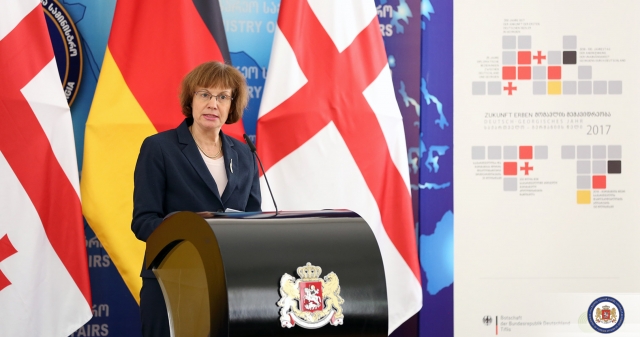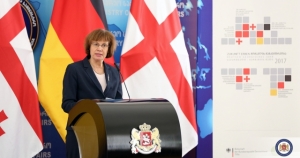Georgian-German Year: A Rich Program of Celebratory Events
This year, Germany and Georgia are celebrating the 25th anniversary of the establishment of diplomatic relations. 2017 is also significant because it is 200 years since the first German colonists came to Georgia. The third important date is connected with the acknowledgment of the centennial of Georgian independence by Germany.
On April 19, the Georgian Ministry of Foreign Affairs hosted the official opening of the Georgian-German year.
Khatuna Totladze, Deputy Minister of Foreign Affairs, was the hostess: “It is of utmost importance to mark the German year in Georgia in the context of Georgia’s being an honorary guest at the Frankfurt Book Fair that is to take place in 2018. Various towns throughout Germany have already hosted a number of Georgian literary events in which Georgian writers took part. Georgia’s participation at Leipzig Book Fair is also worth mentioning. What’s more, this year, Berlinale screened three Georgian films.”
The Georgian-German year in Georgia is to feature a number of cultural events, including concerts, exhibitions, theatrical soirees, sports events, as well as other types of meetings, throughout Georgia.
“The tight collaboration that has formed between parties has very much impressed me: between the German Embassy and Goethe Institute, between the Georgian Ministry of Foreign Affairs and Georgian Ministry of Culture and Monument Protection, and with other German organizations in the cultural sphere,” said H.E. Ambassador of Germany to Georgia, Mrs. Heike Peitsch. “Our aim is to show our bilateral relations, that count 200 years, from a fresh angle. By marking the Georgian-German year, we wish to research the diversity and intensity of the cultural, political and economic relations that already exist. We wish to highlight them in order to make the knowledge of that history even deeper in the German and Georgian social consciousness.”
The Ambassador also stressed the importance of emphasizing the common achievements in any field in terms of a “common democratic future”, even more so that the motto of Georgian-German year is ‘Future Heritage’. “We have tried our best to involve as many participants as possible. The feedback surpassed all our expectations,” she said.
“The cultural ties between Georgia and Germany are longer and richer than those between many other countries,” said Stephan Wackwitz, Director of Tbilisi Goethe Institute. “This tradition comes from the 19th century, when the Georgian National Movement received important influence from German romanticism and classical literature. Germany travelers, writers and architects described Georgia as the place where East and West meet.”
He went on to highlight the German hue that is characteristic to Bolnisi and Asureti architecture, as well as the great part of Tbilisi architecture of the 19th century. He also remembered Goethe’s ‘Sorrows of Young Werther,’ found on the table of great Georgian writer and poet, Vazha-Pshavela. “In my opinion, the past is not just the past, but it also continues in the present. We want to show our history to all interested parties; to inspire them via our past to future collaboration.”
The program of the German-Georgian year is rich. Within its framework, Sasha Waltz, the most famous German choreographer, and her dance company, will return after two years since her last visit. The Tbilisi Theater Festival is to feature one of the most interesting German troupes, ‘Rimini Protocol’ to present the experimental theater performance ‘Home Visit Europe’ with the collaboration of the Marjanishvili Drama Theater, Tbilisi. The Georgian National Museum will open an affiliated office in Bolnisi, Kvemo Kartli region, which was built by German captives. Young businessmen will have an opportunity to attend a start-up forum. Discussions will be followed by reports and publications about Tbilisi architectural heritage as well as depicting the private memories of Georgian citizens about the shared history. In the program of the cinema festivals, the main emphasis will be made on German films and directors. The Tbilisi Literary Festival of 2017 will also put Germany in the spotlight. It is also planned to hold meetings between Georgian and German writers, curated by Nino Kharatishvili, herself a German-Georgian author. German authors will be taken on a tour around the regions of Georgia, after which a publication will be prepared for Frankfurt Book Fair 2018. Moreover, a lot of small events are planned featuring the winners of a tender of the German Embassy: a children’s playground will be installed by Georgians and Germans, a street festival will take place on Aghmashenebeli Avenue, and the German Embassy plans a great “surprise” musical event at some point within the Georgian-German year.
By Maka Lomadze












